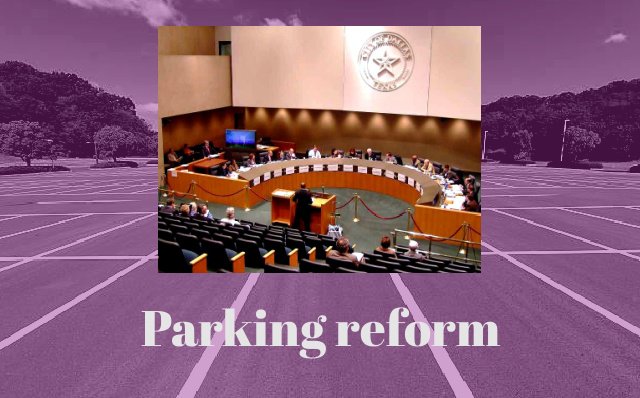Dallas real estate developers may soon get to decide for themselves how many parking spaces are needed for new construction — rather than adhering to minimum requirements that reform advocates say have left the city with ugly, vacant lots and business deals that won’t pencil.
The argument for parking reform is that no savvy business leader is going to build a restaurant, for example, with too few spaces to prevent customers from patronizing. The argument against it is that when people can’t find a parking space, they tend to spill over into neighborhoods, creating hazards and taking the spaces from those who live there.
The City Plan Commission was briefed on the matter Thursday morning and did not make a decision, but it looks like a deeper discussion of a proposed ordinance will go before the panel on Dec. 5. Ultimately it’s up to the City Council to decide whether to change the code.
When the multi-hour meeting kicked off Thursday morning, District 10 Plan Commissioner Tip Housewright, an architect, said the parking reform ordinance has the potential to do more good for the city in terms of land use and urban design “than anything else we’ll do at this horseshoe today.”
“This is really, really important,” he said. “As a practicing commercial architect, the first thing you do when you start a project is figure out how to solve parking before you even design the building. It really shouldn’t have to be that way. We consistently build 20 to 30% more parking for our projects than is needed. I’m a big supporter of this ordinance … I would love to see us treat this, frankly, with some urgency.”
Watch the Nov. 21 City Plan Commission meeting here.
The Cost of Being Overparked
Michael Wade, interim chief planner of code amendments, reviewed the history of Dallas’ parking code. Adopted in 1965, the parking code is “outdated and dysfunctional,” Deputy Planning Director Andreea Udrea said in September 2023.
An overhaul was first proposed by Councilmember Chad West in 2019 but got tabled due to changes in leadership, Wade said Thursday.
“We’re studying this because, over time, these parking regulations have been found to get in the way of some city goals,” Wade said.
For example, the regulations slow and prevent new housing production, constrain adaptive reuse and redevelopment of existing buildings, and impose a “really cumbersome process for staff and anyone trying to … get their project permitted,” he added.
“It disproportionately burdens small businesses, and this has an equity impact,” Wade said. “It perpetuates an unsafe, unwalkable, and totally unpleasant environment very often. It works against adopted environmental sustainability goals, preserves a financially underperforming land use, and overall, is just a very generic, relatively baseless solution that has very little to do with the context of any given land use.”
The Zoning Ordinance Advisory Committee, a subcommittee of the CPC, voted in January to move the matter forward, suggesting that parking minimums be eliminated for new construction.
Parking spaces are expensive to build, which translates into rent and home price increases. The antiquated parking code also has prohibited new businesses from opening. Chase Beakley bought a site in Old East Dallas and planned to open a wine bar last year, but couldn’t make the deal work because of the required number of parking spaces. The city’s restaurant requirement is one parking space for every 100 square feet. Retail requires one space for every 200 square feet.
Beakley would have had to provide 46 parking spots for a small wine bar, the entrepreneur told CandysDirt.com last year.
Questions, Comments, Concerns about Parking Reform
It’s clear that while many city leaders desire a more walkable environment throughout Dallas, it’s still a car-centric community, which creates planning challenges.
District 3 Commissioner Darrell Herbert said his Southwest Dallas district has a lot of large apartment complexes that create overflow parking challenges on streets and in neighborhoods.
“If you don’t have a car in the southern sector, you are not successful,” he said. “Our buses don’t align with the community unless you are going to work in Plano. I get the idea of [parking reform] … to make our areas liveable. It’s an overall picture, but it’s going to take an overall organization of [Dallas Area Rapid Transit] and national organizations and state organizations. I think there are areas where this will work but I also think there are areas of concern that exist today where we need to have a plan to bring urban living, more mixed-use, and more mixed development … so people can survive.’
Commissioner Deborah Carpenter inquired about the stipulation that business owners must work with staff to take corrective measures when a spillover problem is identified. Wade said such a practice is already in place, but it can be written into the ordinance to give it teeth.
Commissioner Melissa Kingston represents “Lowest Greenville,” where “we use parking to manage the balance of uses.”
“If we eliminate parking minimums, I anticipate that what we now have as neighborhood-serving retail establishments and neighborhood services will become more bars and restaurants,” she said. “How does eliminating all parking minimums benefit Lowest Greenville and communities like that?”

Wade responded that bars are subject to Specific Use Permits, which must be scrutinized by the CPC and Council. Restaurants also have to submit to a “residential adjacency review” when they are within 330 feet of a neighborhood.
No date was given for a future council presentation but Wade said it would take a few weeks to refine the ordinance based on the feedback provided Thursday.











